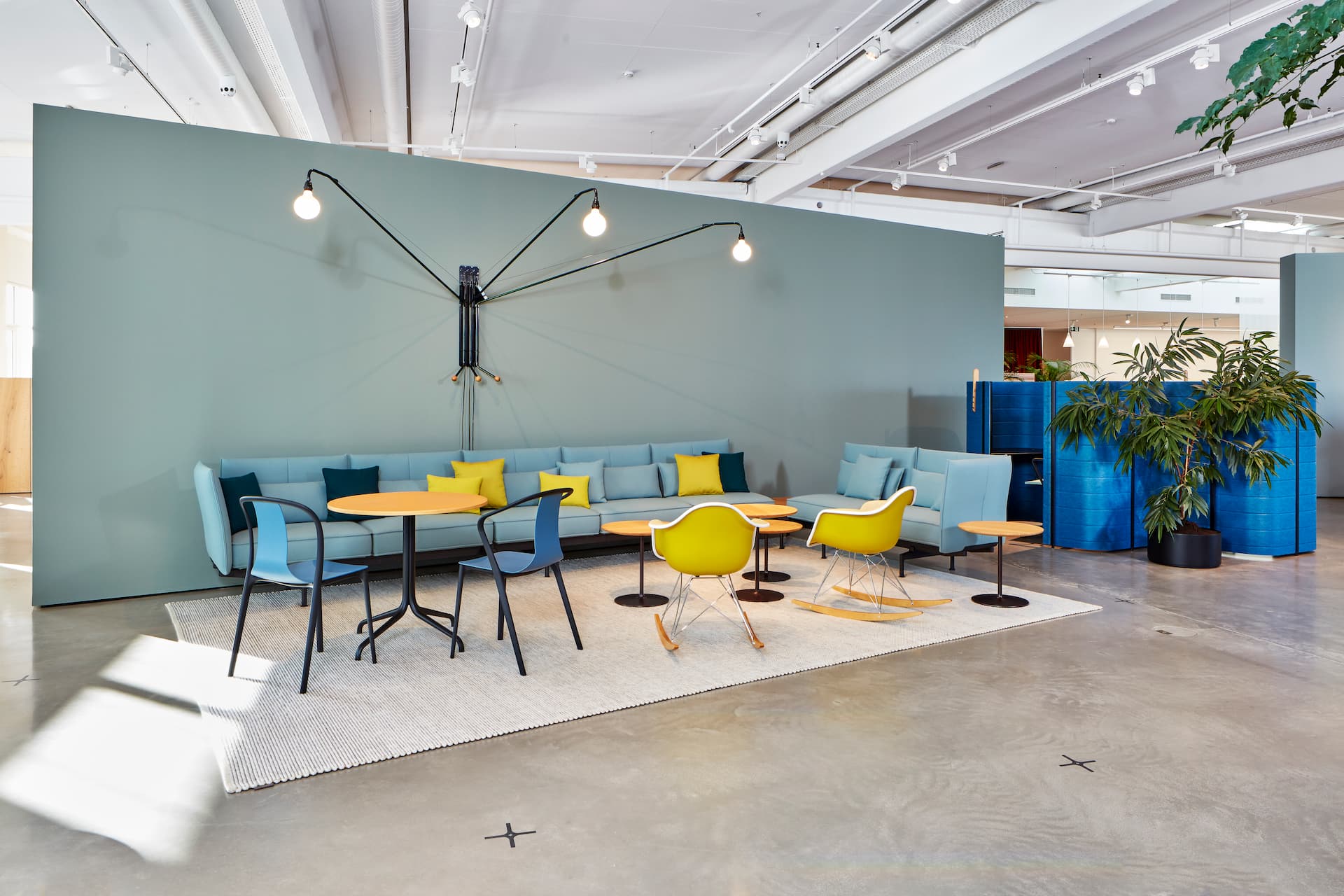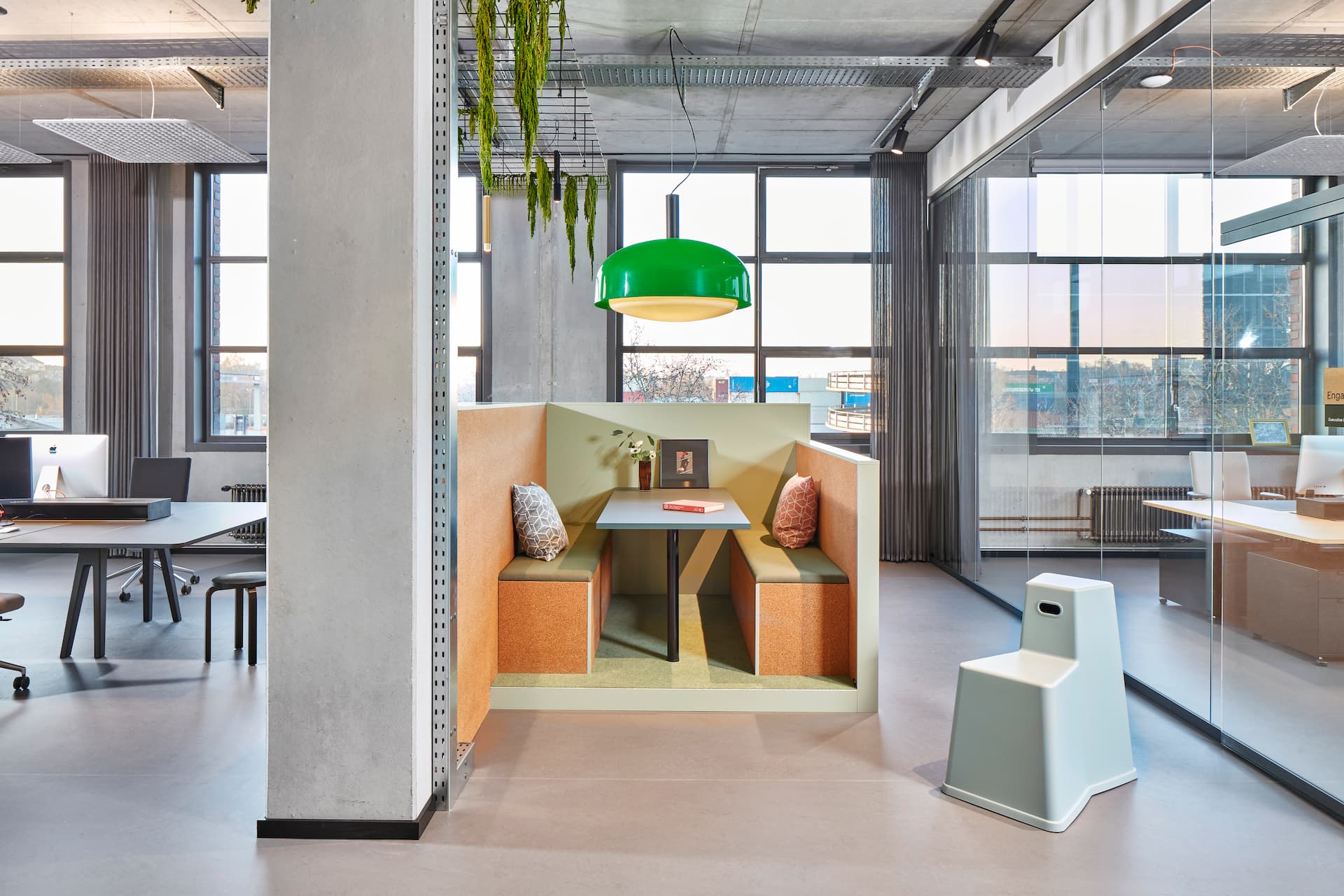Workspace Design for the Future: Vitra’s Club Office
March 3, 2021

5 min

From our series: New Work teams up with Workspace Design: Where will we work in the future?
The Human & The Office – a never ending relationship? Offices have undergone many transformations in the last 150 years: from secretarial pools to rows of desks in open-plan offices, followed by cubicles to minimize distractions before ultimately evolving into today’s open-space environments without designated work stations. With the Corona crisis currently shaking things up significantly on the workspace scene, many are asking themselves what functions the office of the future will need to fulfil. Vitra’s answer to this question comes in the form of their newly developed ‘Club Office’. While Vitra is well-known for its classic office furniture, which ranks among the most revolutionary 20th-century designs, they’re also a frontrunner in workspace design, especially when it comes to re-thinking spatial concepts. In 2021, with the introduction of their new Club Office concept, Vitra continues to assist companies with their innovative approaches to contemporary physical workspace design.
The office as a social space: Why do we need physical workplaces?
“The Corona crisis is currently shaking things up and is already accelerating sophisticated changes such as digitalization and remote work”, notes Manuel Gründel, who is responsible for Workplace Development at Vitra. With the pandemic we find ourselves in a new situation, needing to take into account issues like social distancing, health and safety at the workplace, a surge in remote work and travel restrictions. At the same time, new necessities are surfacing, such as increasing social needs, a yearning for a sense of belonging and human interaction, as well as the shifting requirements brought about by the mixing of personal and professional life. As with all genuine transformations, for many of these needs and developments, there will be no turning back, even in the post-pandemic world.
Vitra zeroed in on the essential question that’s currently on the minds of many: “Just what is the purpose and function of a physical workspace?” Similarly, the Founders Forum went on to survey founders and teams of start-ups who are currently working remotely. The results yielded some very interesting findings:
- 73% of the respondents missed social interaction at the office
- 51% of the respondents missed working with others at the office
- 40% of the respondents missed the separation of private and professional life provided by working in an office space.
What we can see is that the office is a particularly important social space. “It’s undeniable that even after the Corona crisis ends, a significant amount of remote work will continue. Yet for exactly this reason, a company’s physical workspace will gain more importance when it comes to incorporating the company’s identity and values as well as fostering the company culture. That’s where the office plays a vital role as the place where people meet and collaborate”, Gründel adds. This realization prompted the next question for Vitra: “What will the office of the future need to offer its prospective employees?” The following considerations surfaced as the main factors for working and work environments:
- Productivity,
- Innovation and inspiration,
- Corporate culture and employee loyalty
This input led Vitra to the ultimate question which paved the way for its Vitra Club office concept: “How should a space be designed, so that it cultivates a sense of identity, of home, of belonging, while also promoting collaboration and innovation?”

The Club Office is an Organization’s Home:
The Vitra Club Office, Vitra’s future-oriented office concept, is driven by these factors. The Club Office’s unique space designs unify belonging, home, collaboration, inspiration and community. “The Club provides a platform for collaborative work and attracts employees like a magnet: a place where people have a sense of well-being, where they prefer to be instead of working at home”, says Gründel while describing the idea behind the Vitra Club Office. As an interface between social life and a place for collaboration and learning, the Club office becomes the company’s ‘home’. There’s also an underlying holistic approach towards working structures which align themselves with certain principles. Vitra works together with each company to ensure that its own identity and culture is integrated into the designing of the space. In the Club, the company is the host for its members, customers, and partners. Their rituals are closely connected to this space, memories and experiences are rooted here. The friendly, warm and inviting interior of the Club provides an environment for conversation, interaction and collaboration. Every part of the space can serve as a productive workspace.
The Club’s Diverse Spaces:
The Club features open areas which are also publicly accessible, where Club members can lounge comfortably on sofas or in armchairs for joining discussions, learning, sharing information or enjoying food and drink together. Restaurants and lounges blend together to become areas where spontaneous work occurs. The public areas are accessible for all teams and their guests, which facilitates ad hoc meetings and get-togethers. Situated in the back of the Club, the company provides its workers with formal conference rooms as well as an area for workshops. For casual working needs, dynamic spaces in various sizes are equipped with furniture designed for flexibility, such as the Dancing Wall, Stool Tool, Tip Ton and Rookie, which can be re-arranged quickly to meet changing needs. Club members set up their own environments, with the ability to alter and adapt them weekly or even daily as needed to create the proper working setup. There’s also always the option of re-purposing and utilizing outdoor areas. A third, ‘private’ Club Office area provides workers with spaces for retreat. The proportion of traditional workplaces has been reduced to a minimum, reflecting the surge in remote work which has lead to more concentrated solo work being carried out at home, in co-working spaces or in flexible offices.
Vitra developed its pilot Club Office at its headquarters in Birsfelden, on the outskirts of Basel, for its R&D team. The public areas are accessible to all Vitra employees and starting in May 2021, visitors will also be welcomed to view these public areas by appointment.